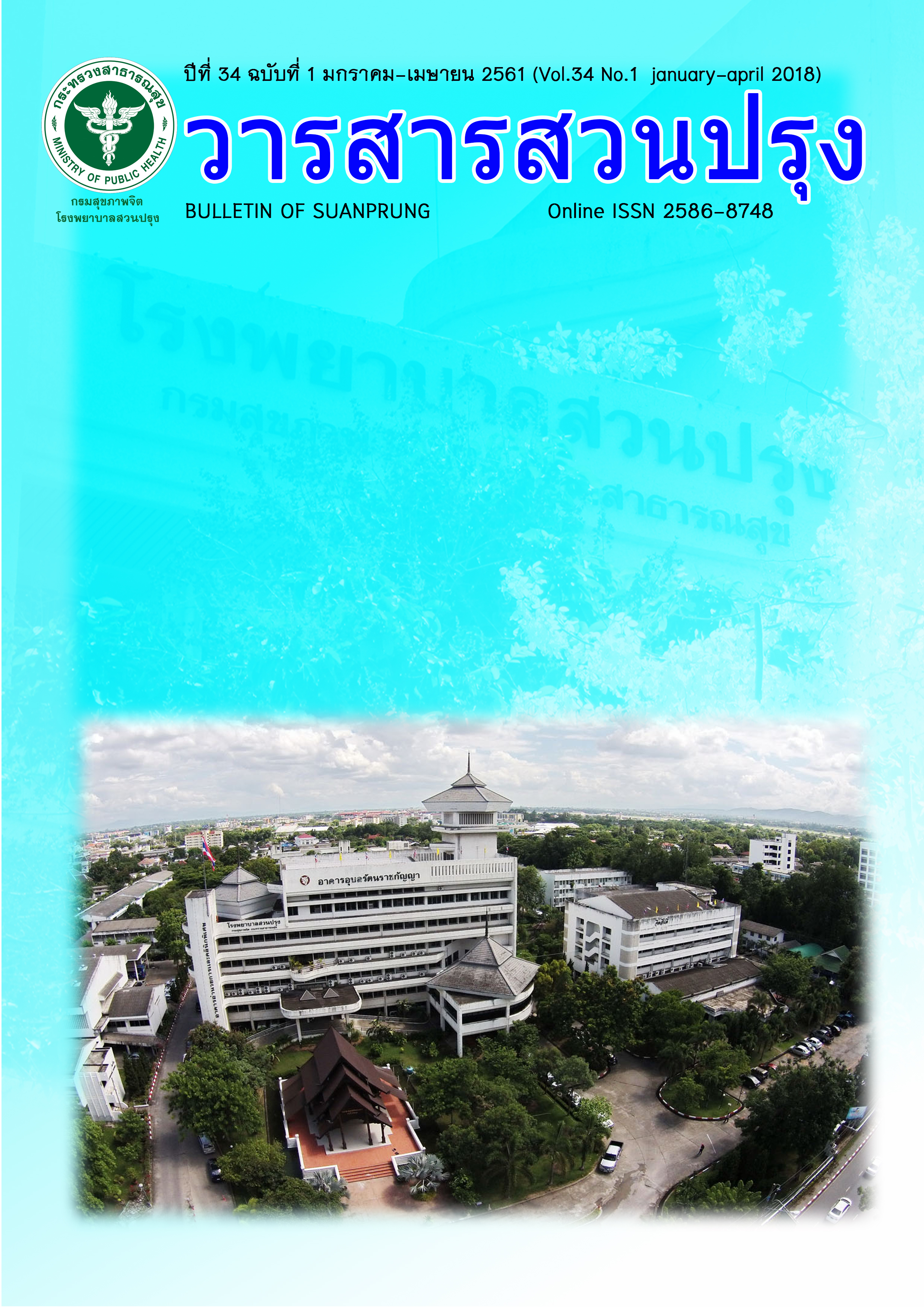Effects of Yin Yoga-Based Mindfulness Practice on Anger Among Female Juveniles in the Regional Juvenile Vocational Training Centre Region 7, Chiang Mai Province.
Main Article Content
Abstract
Objective: This study aimed to define the effects of Yin Yoga-based mindfulness practice on anger among female juveniles in the Regional Juvenile Vocational Training Centre Region 7, Chiang Mai Province.
Materials and methods: This was a pre-experimental design study with a single group that included pre-test and post-test comparison. Ten qualified female juveniles attended Yin Yoga-based mindfulness practice, which comprised 120-minute sessions 10 times for 5 weeks. An anger questionnaire was administered. Data were analyzed by using the Wilcoxon Signed-Rank Test.
Result: After completing the program, the average State-Anger (S-Anger) score of the participants was significantly lower than before the program started (P < 0.05). There were no significant differences in the Trait-Anger (T-Anger), Anger-in (AX/In), Anger-out (AX/Out), and Anger-control (AX/Con) between pre and post participation in the program.
Conclusion: Yin Yoga-based mindfulness practice affected only the state-anger of the subjects, but did not affect the other components of the anger questionnaire.
Keywords: Anger, Yin yoga, Mindfulness, Female juveniles.
บทคัดย่อ
วัตถุประสงค์: เพื่อศึกษาผลการฝึกสติตามแนวหยินโยคะต่ออารมณ์โกรธของเยาวชนหญิงในศูนย์ฝึกและอบรมเด็กและเยาวชนเขต 7 จังหวัดเชียงใหม่
วัสดุและวิธีการ: เป็นการศึกษาแบบกึ่งทดลอง 1 กลุ่ม เปรียบเทียบผลก่อนและหลังโปรแกรมการฝึกสติตามแนวหยินโยคะในกลุ่มตัวอย่างเยาวชนหญิง 10 คน จำนวน 10 ครั้ง ครั้งละ 120 นาที เป็นเวลา 5 สัปดาห์ วัดผลโดยใช้แบบประเมินอารมณ์โกรธ วิเคราะห์ข้อมูลจากแบบประเมินโดยใช้สถิติ Wilcoxon Signed-Rank Test
ผลการศึกษา: ค่าเฉลี่ยของคะแนนอารมณ์โกรธแบบสภาวะของกลุ่มตัวอย่างก่อนเข้าร่วมโปรแกรมและเมื่อสิ้นสุดโปรแกรมการฝึกสติตามแนวหยินโยคะแตกต่างกันอย่างมีนัยสำคัญทางสถิติที่ระดับ 0.05 โดยเมื่อสิ้นสุดโปรแกรมคะแนนอารมณ์โกรธแบบสภาวะมีค่าลดลง ส่วนค่าเฉลี่ยของคะแนนอารมณ์โกรธแบบลักษณะ การเก็บอารมณ์โกรธไว้ภายใน การแสดงอารมณ์โกรธออกภายนอก และการควบคุมความโกรธ ทั้งก่อนและหลังการเข้าร่วมโปรแกรมไม่แตกต่างกัน
สรุป: การฝึกสติตามแนวหยินโยคะส่งผลต่ออารมณ์โกรธของกลุ่มตัวอย่างเฉพาะอารมณ์โกรธแบบสภาวะ แต่ไม่ส่งผลต่อองค์ประกอบอื่นๆ ตามแบบประเมินอารมณ์โกรธ ผู้เกี่ยวข้องในศูนย์ฝึกและอบรมเด็กและเยาวชน สามารถนำความรู้ที่ได้ไปใช้เป็นแนวทางในการจัดการอารมณ์โกรธได้
คำสำคัญ: อารมณ์โกรธ, หยินโยคะ, สติ, เยาวชนหญิง
Article Details
บทความหลังผ่านการปรับแก้จากกองบรรณาธิการแล้ว เป็นลิขสิทธ์ของวารสารจิตเวชวิทยาสาร โรงพยาบาลสวนปรุง กรมสุขภาพจิต กระทรวงสาธารณสุข ห้ามเผยแพร่เพื่อประโยชน์ทางการค้าโดยไม่ได้รับอนุญาต แต่อนุญาตให้เผยแพร่บทความดังกล่าวเพื่อประโยชน์ทางการศึกษาแก่ประชาชนทั่วไป ทั้งนี้กองบรรณาธิการไม่จำเป็นต้องเห็นด้วยกับบทความหรือข้อคิดเห็นใดๆ ที่ปรากฏในวารสารสวนปรุง

